What if I told you there was an angel out there who could help you with things like gig referrals, grant funding, and other career opportunities?
What if there were several angels whose job descriptions included helping you thrive as an independent artist?
And what if I told you this was all free, and all you had to do was reach out to them?
Too good to be true?
 I can’t remember exactly when it first dawned on me that a) there’s an arts council right in my own community, and b) it seems like maybe they do stuff for artists.
I can’t remember exactly when it first dawned on me that a) there’s an arts council right in my own community, and b) it seems like maybe they do stuff for artists.
But what do they do?
That was the part I couldn’t exactly answer. From what I’ve seen, there are lots of other performing artists in that same boat.
Discovering My Arts Council
I recall stumbling across the website of my local arts council one day, and poking around a bit.
Unfortunately, I didn’t see anything that said:
 Instead, I saw notices about theater auditions, and calls for artwork, and trainings on working with disabled populations – all great things, but none that were immediately relevant to my situation.
Instead, I saw notices about theater auditions, and calls for artwork, and trainings on working with disabled populations – all great things, but none that were immediately relevant to my situation.
So, I moved on.
Arts Council Grants: Rediscovering My Arts Council
It wasn’t until a few years later – and I’m not exactly sure what brought me back – that I discovered an intersection between what I was doing and what they did.
My opportunity
I had received some favorable press in England and Scotland following the release of my first solo CD (of old New York State folk music!), and those reviews led to a couple of unexpected offers to perform over there.
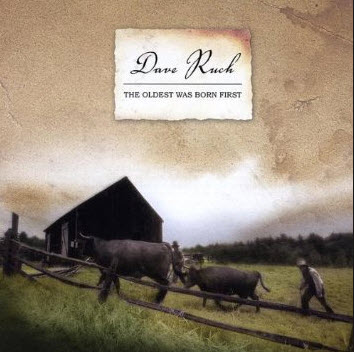 I was thrilled, and really eager to do it.
I was thrilled, and really eager to do it.
The problem was that it was going to cost me upwards of $2,000 in expenses to take advantage of this opportunity. It seemed like a losing proposition without a little help.
Long story short: I learned about a funding category at my local arts council for “special opportunities.” I called, visited, and ultimately was able to secure a grant to offset some of the expenses for the trip.
That made a big difference.
More opportunities
The very next year, I was awarded a grant to teach at a low-paying but otherwise important music weekend.
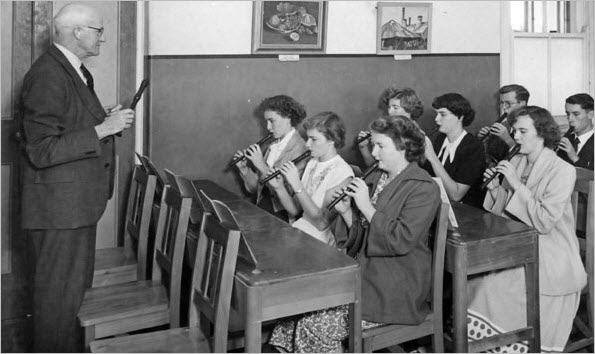 A few years after that, a professional development opportunity was funded enabling me to study some occupational music at Mystic Seaport and bring what I learned back to my local community’s waterfront for some performances.
A few years after that, a professional development opportunity was funded enabling me to study some occupational music at Mystic Seaport and bring what I learned back to my local community’s waterfront for some performances.
In the years since then, programs provided by the wonderful new arts service organization in town (Arts Services Inc, or “ASI”) have allowed me to:
- attend six or more high-quality professional development workshops
- learn about opportunities for funding at the local and state levels
- discover best practices for writing grants and getting media coverage
- work on two long-term music projects in a local school district (see the article “How to Get Gigs in Schools“)
 I’ve been rejected too!
I’ve been rejected too!
Don’t get me wrong – I’ve been turned down for funding on several occasions; sometimes after spending significant amounts of time and energy attending meetings and gathering materials for the grant application.
That hurts, but, I chalk it all up to learning how to do this, and each time I’ve been rejected, valuable feedback has come back from the council and/or the funders to help inform my next application.
Just as importantly, good relationships with the staff have been built in the process. (More on that in a minute.)
What Arts Councils Can Do For You
In my opinion, every musician, storyteller, belly dancer, mime, puppeteer, and performing artist should connect with their arts council.
 Let’s take a look at some of the key things arts councils can do for you as a performing artist…
Let’s take a look at some of the key things arts councils can do for you as a performing artist…
Funding
From individual artist grants (for you), to “presenting” grants (for organizations that can hire you), to knowledge of the larger funding picture in the community, your arts council is your first stop in seeking financial support for your work.
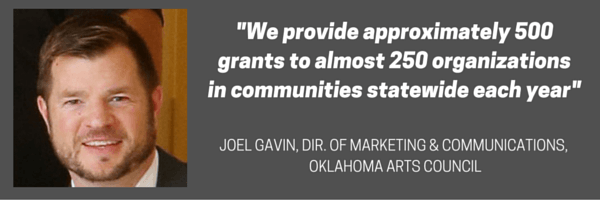 Most arts councils are “granting” and “regranting” organizations themselves, meaning that they can award funding to individual artists and/or presenting organizations who hire performing artists.
Most arts councils are “granting” and “regranting” organizations themselves, meaning that they can award funding to individual artists and/or presenting organizations who hire performing artists.
Arts councils also keep tabs on other funding opportunities at the state, regional, and national levels, and in the private sector.
 As an independent artist, it’s really important to stay on top of all of these possibilities.
As an independent artist, it’s really important to stay on top of all of these possibilities.
 The people who hire you to perform (“presenters,” in arts council terminology) aren’t always aware of all the funding options either. Staying current on grant opportunities for the venues I work in – schools, performing arts centers, libraries, concert series, historical societies, museums – has allowed me to suggest funding channels to them, creating tremendous goodwill and very often leading to future bookings for me (so much so that I recently compiled a guide on Grant Funding for Performances and Lectures that you’re welcome to steal – share it with any venue that can’t afford to book you outright).
The people who hire you to perform (“presenters,” in arts council terminology) aren’t always aware of all the funding options either. Staying current on grant opportunities for the venues I work in – schools, performing arts centers, libraries, concert series, historical societies, museums – has allowed me to suggest funding channels to them, creating tremendous goodwill and very often leading to future bookings for me (so much so that I recently compiled a guide on Grant Funding for Performances and Lectures that you’re welcome to steal – share it with any venue that can’t afford to book you outright).
Professional Development
Workshops and seminars for artists, on both arts and “business of art” topics, are at the very heart of most arts councils’ missions.
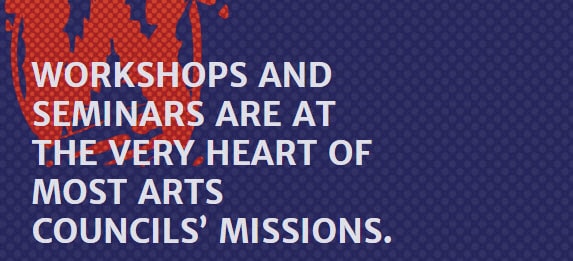 A quick look at ASI’s website shows recent and upcoming sessions on each of the following topics:
A quick look at ASI’s website shows recent and upcoming sessions on each of the following topics:
- applying for county funding
- latest grant opportunities from the state arts council
- how to create videos
- DIY websites for artists
- a talk from the CEO of Americans for the Arts
- selling art online
- the artist as entrepreneur
Connections
Arts councils are well connected to the arts and cultural goings-on in the community, and that means new relationships and opportunities for you.
Here’s Joycelyn Reynolds from Arts Council New Orleans:
“Arts councils have expert knowledge of the arts activities in the community and can serve as a connector for artists providing introductions and access to leaders in the field, job opportunities, and funding opportunities.”
Even beyond the immediate arts scene, arts councils tend to be involved in the larger civic life of the community, helping to connect the dots between the arts/cultural sector and various public and private institutions.
 Collective Voice
Collective Voice
“You must be the change you wish to see in the world.” – Mahatma Gandhi
Arts councils are tireless advocates for broader arts support at the state and federal levels, and in our own communities, and they’re stronger with all of us involved.
Enough said.
(Interested in “going to bat” for the arts? Americans for the Arts gives several good arts advocacy ideas here.)
Performing Artist Roster
A major benefit of connecting with some (though not all) arts councils is the prospect of joining their vetted roster of “exemplary” performing artists.
 Joel Gavin of the Oklahoma Arts Council explained to me how their statewide artist roster works:
Joel Gavin of the Oklahoma Arts Council explained to me how their statewide artist roster works:
“The Oklahoma Performing Artist Roster includes some of the finest performers in a variety of disciplines who are available to perform in communities across our state. Artists apply and are vetted through a rigorous process to ensure we maintain a high-quality roster. Each artist or group has a page on our website with a description of their services, bio, approximate fees, and contact information. Through our ties to hundreds of arts organizations, schools, and art presenters statewide, the roster often connects performing artists with potential bookings. We also encourage our grantees to consider hiring roster artists because it ensures the artistic quality of their events. Occasionally, we have been able to offer professional development opportunities exclusively for roster artists. We try to build in value for them when and where we can.”
Suffice it to say that inclusion on an “approved” artist roster, if available, is a fantastic opportunity for more and better-paying gigs.
Even if you’re this guy…

 If your performances contain an educational component or any humanities content, check your statewide humanities council for a similar roster of approved “speakers” or “scholars.” I was accepted to such a program with the New York Council for the Humanities back in 2006, and have done over 275 funded engagements for them since. (See the article “Educate Your Audience and Write Your Ticket” for more on this type of performing.)
If your performances contain an educational component or any humanities content, check your statewide humanities council for a similar roster of approved “speakers” or “scholars.” I was accepted to such a program with the New York Council for the Humanities back in 2006, and have done over 275 funded engagements for them since. (See the article “Educate Your Audience and Write Your Ticket” for more on this type of performing.)
Artist Directories
Somewhat different from performing artist rosters, artist directories tend to be open to any and all artists who’d like to list themselves.
 Again, not all arts councils maintain such a directory, but if yours does, by all means get listed there along with a link to your website, descriptions of your range of services, etc.
Again, not all arts councils maintain such a directory, but if yours does, by all means get listed there along with a link to your website, descriptions of your range of services, etc.
“If they don’t have an artist directory, ask them to view ours or others for ideas.”
– Shannon M. Linker, Arts Council of Indianapolis
Paid Performances & Gig Referrals
Also under the “some do, some don’t“ category, your arts council might (with any luck):
- run their own performance series, or
- book performances for other community entities, or
- provide referrals to organizations and events looking for entertainment
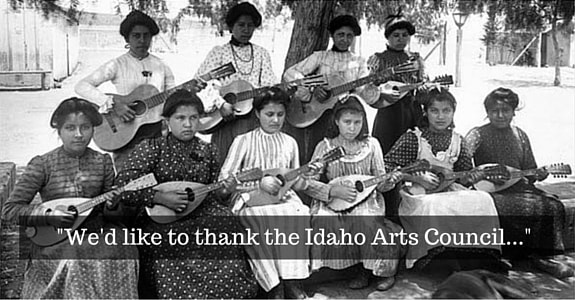 How do you know whether your arts council does any of these things?
How do you know whether your arts council does any of these things?
Just ask them.
Newsletters
Want all the latest info on all of the above, right in your inbox?
 Every arts council I’ve spoken with has one or more e-newsletters they send out on a regular basis.
Every arts council I’ve spoken with has one or more e-newsletters they send out on a regular basis.
For free, of course.
“Artists should sign up for e-newsletters sent out by local, regional, and statewide arts councils as these emails contain information about opportunities for artists.”
– Joycelyn Reynolds, Arts Council New Orleans
Anything Else You’d Want?
Ask for it! Shannon M. Linker of the Arts Council of Indianapolis told me this:
“We respond directly to the needs of our artists. Each of our programs has come from a random question, a disgruntled caller, or a friendly discussion at an arts event. If your arts council doesn’t hear from you, it is much more difficult for them to respond to the actual needs of the community with quality programs and services. I can almost guarantee you that the staff very much wants to help and be involved with (specific services for artists) if they are not already, they just need to hear from enough artists and other constituents to make it a priority.”
 Where to Start: State or Local Arts Council?
Where to Start: State or Local Arts Council?
That is the question.
And the answer, according to the experts, is “both.”
And, “it depends.”
“(Artists should connect with) both – though not all places have both. I think it’s worth starting locally and then expanding out as the many types of resources and opportunities that are available to performing artists span these different levels of arts councils. It all depends on where you are in your performing arts career and what you want to do with your career.”
– Jennifer Swan, ASI, Buffalo NY
 “This depends on their goals. Some artists prefer not to travel too far or too often, so they may want to start by connecting with local arts councils. If they want to cast a wide net in hopes of enhancing their chances for bookings and increased exposure, it’s sensible to make connecting with the state arts council a priority. Connecting with the appropriate staff person with the local and state arts council who work with performing artists would be worth the artist’s time in both cases.”
“This depends on their goals. Some artists prefer not to travel too far or too often, so they may want to start by connecting with local arts councils. If they want to cast a wide net in hopes of enhancing their chances for bookings and increased exposure, it’s sensible to make connecting with the state arts council a priority. Connecting with the appropriate staff person with the local and state arts council who work with performing artists would be worth the artist’s time in both cases.”
– Joel Gavin, Oklahoma Arts Council
 “Often state arts agencies have different services so they should absolutely connect with both. It depends on the location, but perhaps the state agency offers more than the local council in their area. There are things the state agency can offer that we can’t and vise versa.”
“Often state arts agencies have different services so they should absolutely connect with both. It depends on the location, but perhaps the state agency offers more than the local council in their area. There are things the state agency can offer that we can’t and vise versa.”
– Shannon M. Linker, Arts Council of Indianapolis
How to Connect with Your Arts Council
It doesn’t really matter how you do it; it just matters that you DO connect with your arts council.
Here’s one way it could go:
Step #1 – Figure out who (and where) they are. Try a Google search for “(Your state/province) arts council” and “(Your local community or county or region or city or town) arts council.” As stated above, there may be more than one you’ll want to connect with.
You can find your state and regional arts councils on this list from the National Endowment for the Arts.
Step #2 – Learn as much as you can about them through visits to their website and talking with other artists. Spend some time figuring out what they do and where you might fit in, and be sure to make a list of any questions you have (for step #4).
Step #3 – Sign up to receive any and all email newsletters and communications offered on their site.
If they have an artist roster or directory, sign up or apply for those too.
Step #4 – Call or email them to touch base, or attend one of their public programs. If you don’t have any specific questions to ask, it’s OK to simply tell them what you do and see how they might be able to help you.
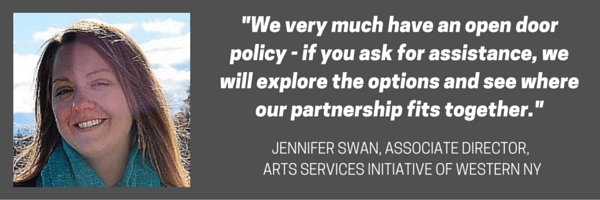 Step #5 (THE most important one) – Set up an in-person meeting and start developing a relationship with them. These are friendly people – angels, even – who really want to help the artists in their community. It’s what they do.
Step #5 (THE most important one) – Set up an in-person meeting and start developing a relationship with them. These are friendly people – angels, even – who really want to help the artists in their community. It’s what they do.
 Some Networking Advice
Some Networking Advice
Shannon M. Linker gives some great tips and advice for building a relationship with your arts council:
“Get to know the key players at both organizations (local and state) – make sure they know your name, your work, your website, and why what you are doing is significant. I appreciate when artists add me to their e-list so I get monthly updates on their work and upcoming events even if I don’t know them personally. It helps keep me informed of what’s going on. It also helps me to know they are engaged in professional practices and can write about their work and promote themselves in a professional way. Knowing they are serious and professional allows me to recommend them for opportunities more often.”
Joycelyn Reynolds echoed the importance of making yourself known to your arts council:
“Allow them to become familiar with your work, which can prove helpful in connecting you to opportunities.”
Wrapping Up
Have I convinced you? Were you already on board?
From funding to connections to learning to collaborating to gig possibilities and more, I hope you can see why every performing artist should connect with their arts council(s) to the fullest extent possible.
I don’t know why it took me so long!
 I’d love to hear how arts councils have (or haven’t) impacted your work – the Comments section is just below.
I’d love to hear how arts councils have (or haven’t) impacted your work – the Comments section is just below.
[optin-monster-shortcode id=”zpfyjkhkiegqzxtb”]
About The Blog
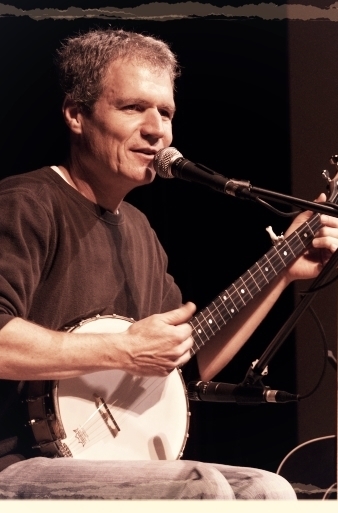 Since leaving a white-collar marketing job in 1992, Dave Ruch has been educating and entertaining full-time in schools, historical societies and museums, folk music and concert venues, libraries, and online via distance learning programs.
Since leaving a white-collar marketing job in 1992, Dave Ruch has been educating and entertaining full-time in schools, historical societies and museums, folk music and concert venues, libraries, and online via distance learning programs.
Along the way, he’s learned a great deal about supporting a family of four as a musician.
The Educate and Entertain blog provides articles, tips, encouragements, and how-to’s for regional performers (in any region) interested in making a great full-time living in the arts.


Hello Dave,
I am curious what your experience has been with arts councils outside of your state? Is it ok to approach them anywhere one is willing to travel to perform? I do projects all over the country and while staying close to home is nice, I’m open to anywhere, and hope to take the project abroad as well! Thank you.
Hi Leslie – many regional and statewide arts council grants are set up to benefit artists who live in that state or region, so that takes us out of the running for some of these. You just have to read the guidelines carefully to determine whether or not you’ll be eligible.
Hi Dave,
Excellent post as usual. However, I’ve found from decades of experience that Arts Councils are problematic to deal with. Let me explain on the local, provincial (I’m in Ontario) and federal levels:
A little background. I’m not a musician, I do arts presentations in puppetry. I actually earn a living from it, so I assume that I’m fairly good at what I do. For the past few years, I’ve been developing a new project featuring giant puppets (16 to 20 feet tall). People who are knowledgeable about the puppetry world tell me that they’re entirely new and unique creations.
The local arts council was offering grants to artists. Reading through the application, I saw that they had ‘priority groups’ such as people of colour, women, LGBTQ, indigenous, etc. Everything but me. So I contacted them to inquire if it was worth my while to even apply. They assured me that it was, noting that if two projects are of equal merit, the grant will go to the member of their priority community. Which essentially means that my art is being judged not on its merits, but by my gender, sexual orientation and race – all of which are illegal in Canada. So I passed.
On the provincial level – you can’t apply directly to The Ontario Arts Council, you have to be recommended. Meaning that I have to approach an “approved” puppet organization and show them my artistic and business plans – for their judgement and possibly approval. Give away all my original work for a grant of $200. Mmm… No thanks.
On the federal level, they told me that they would need to bring in a puppet expert to adjudicate my work. I explained that what I’m doing is unique, original and doesn’t fall under marionettes, hand puppets, etc. They said that they would find “someone…”. Meaning that I would have to educate someone, so that they could judge me. Again, I passed.
I have been self funding these first creations – a few dollars here, a few dollars there. And when the first two are revealed to the world next spring – I’m going to crowdfund the rest.
The situation in Canada seems very different from that in the U.S..
Thoughts and suggestions would be welcome.
Thanks!
Hi, Steve – I’m sure the situation is somewhat different in Canada, although, rest assured – there are plenty of hurdles to accessing funding on this side of the border, too. If the article makes it sound easy, that’s my fault. There are often criteria that I wish weren’t there, but it is what it is and the funding has allowed me to do several things I wouldn’t have otherwise.
Hi Dave,
No doubt the funding is there – and is a huge benefit IF you can get it. I just find the process and “fine print” so frustrating that for me, it’s not worth the effort.
Thanks a lot Dave. Very interesting and helpful article (as always 😉🙏).
I’m based in Portland, Oregon. Do you know if I can only try and get help from art councils in Oregon, or can also reach out, for example, to some in Washington State or California ?
Thanks for everything,
Eric
Hi Eric John – there is usually a residency requirement (i.e. the artist must live in the arts council’s service area), but there are also exceptions to that. I would start local, then regional/statewide, then beyond.
Merci Monsieur Dave!👍 😀
Dave, I have been in disbelief my whole life that someone would give me enough money to survive so I could compose my magnum opus. I am 24, and I have been trying to start online businesses for the past 4 years to generate enough income so I can finally have time to be free and compose very intricate, avant-garde music. Since I was a child, I have dreamed of changing the way the world thinks about music, about sound. I have been learning, composing, experimenting, as much as possible the past 12 years. Maybe I am speaking too broadly, but examples of ideas I am talking about are microtonality, rubato playing, psychoacoustic techniques, and much much more. Are there any type of grants that give the composer full freedom of style? I am afraid that I do not fit in any musical genres, so I have been doing everything on my own for years.
Kind Regards,
Kevin Fechtel
Hey Kevin – I’m not super “up” on composer grants, but I know there are a lot of them out there. I’d try lots of Google searches, and also use the granting search engine at NYFA Source.
I would also say this – continue to disbelieve that someone will give you enough money to survive so you can pursue your art! Grants are very helpful, but they take a lot of work to acquire and they rarely if ever give you enough freedom to do nothing but exactly what you want to.
Wow Dave …. Another great, informative post. I just registered for the Ohio Arts Council. Didn’t know a thing about it until today. And I even know a few of the performers personally.
Thanks again. You the man. Besides being a talented musician / performer, you can also write. Rare combination …
And again, I appreciate your sharing this information.
I love to hear that Steve – go!! Keep us posted on how it goes for you. I think the most important thing is to not be a stranger to your arts council. Make sure they know who you are, attend their seminars and events, etc.
Great article, much enjoyed, thanks!
Thanks Elizabeth!